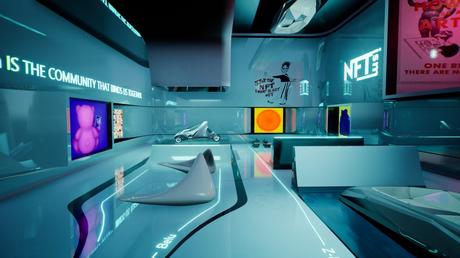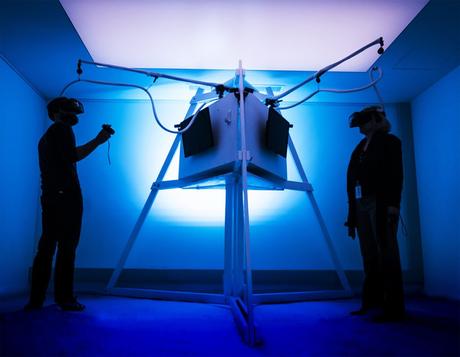
When a woman walks into an unstaffed Watson convenience store, an AI system quickly recognizes her and suggests her favorite snacks and lipsticks, which she can buy with her phone.
While flames reaching over 1,000 degrees Celsius roar from a furnace at a nearby steel production line, an engineer uses a digital twin plant to closely watch and manage the production process from his air-conditioned office.
As soon as a ship with 80,000 tons of sugar leaves Brazil for China, a system based on “cloud native” technology predicts the weather during the trip, the paths of other ships, and how the shipment of goods will affect the global economy.
At the World Artificial Intelligence Conference (WAIC) 2022 in Shanghai, these are just a few of the many ways the metaverse will change people’s lives, as well as how cities work and how different industries work.
The metaverse is a group of 3D virtual worlds that focus on communication between people. The phrase was first used in Neal Stephenson’s science fiction book “Snow Crash,” which came out in 1992 and is set in a 3D virtual world where people interact with each other.
The 2022 International AI City Forum, which was held in conjunction with the WAIC, said that the concept of a “metacity” would become an updated version of the “digital city” and an unavoidable trend in the future development of cities.
Wu Zhiqiang, a member of the Chinese Academy of Engineering, says, “Metacity is the core of the metaverse, where we can use imagination to drive the creativity of the real city, while the construction in the real city can also bring more opportunities to the metacity,”
Scientists and government officials from Finland, Germany, the United Kingdom, and the United States talked about their latest ideas for the metacity at the forum.
Wu made the first City IQ index in the history of the world to measure how smart 500 cities in 116 countries are in terms of their smart environment, government services, economy, infrastructure, and innovative talent.

City IQ says that Tokyo, Paris, and London are the top three cities. Shanghai comes in at number twelve, after other Chinese cities like Shenzhen (fourth), Beijing (fifth), Hong Kong (eighth), and Guangzhou (9th).
In an effort to be smarter, Shanghai opened a Social Governance Collaborative Innovation Center for Artificial Intelligence in Yangpu District on Friday.
The goal of the center is to use AI technology to help the city become more digital and the global scientific innovation center grow. Yangpu, local universities like Tongji, Fudan, and Shanghai Jiao Tong, and the tech giant Alibaba worked together on it.
The development plan says that until 2026, the center will make and use AI applications in many neighborhoods and communities.
During the second phase, which runs from 2027 to 2035, the center will make big strides in AI applications and show other Chinese cities how intelligent social government works. One of its main areas of focus is cloud-native, which tries to get digital businesses in the area to use open-source and collaborative technologies. Yangpu has started working with partners from cities in the Yangtze River Delta on the WAIC’s Digital Native Evolution sub-forum.
At the sub-forum, local startup DaoCloud and Chinese tech company Huawei showed off their super-integrated cloud-native coordination machine. The suitcase-shaped machine has six servers and a high-density storage and computing network. Chen Qiyan, who made DaoCloud, says that it will be used in Watson’s upcoming unmanned chain shops to track and analyze how each customer buys things.
Chen said that cloud-native technology would be used to combine the data collected by each chain shop in real time. This would eliminate the need to send the data to Watson’s corporate offices.
Metaverse is also changing one of the city’s main plans for growth: the industrial transformation of the northern Baoshan District, which used to be the center of iron and steel production. At the ninth China Industrial Internet Summit, which was held over the weekend in Baoshan near high-tech parks, intelligent manufacturing factories, and biomedicine companies, ten promising industrial metaverse applications were shown off.
They include robots that patrol production lines, unmanned logistics in industrial parks, and machines that check quality and figure out what’s wrong.
Zheng Yang, the deputy director of the Baoshan Economic Commission, says that these applications show how the industrial Internet has changed into the “meta-industry.”
“We aim to use metaverse technologies to increase output, while reducing the cost for many manufacturing companies who have to handle complicated production processes.”

The Nanda Digital City and Wusong Smart City will grow into a group of meta-industry incubation parks and industrial bases. These two new subcenters are based on the old chemical and iron-steel factory clusters in the north of the city.
Also, the first group of pilot meta-industry factories will be shown off at well-known companies like Fanuc Robot, CanSino, and Baowu Steel.
In the past few years, Shanghai’s AI production has doubled to more than 300 billion yuan ($43.5 billion) a year.
The city government thinks that by 2025, the size of industries related to the metaverse will be 350 billion yuan. This is because the district and city governments have taken a number of positive steps.
In Xuhui District, the first set of policies to help the metaverse industry at the district level were made public. The government of the district promised to pay for the design of metaverse content, the creation of scenarios, and research and development on wearable tech.
Yu Linwei, who is the deputy director of Xuhui, said that “Leading global metaverse companies are welcome to Xuhui to develop a batch of pilot applications on game, consumption, culture, education, medical services and government affairs,”
“Xuhui will offer equal support to the metaverse sectors as to the AI industry when it emerged several years ago.”
During the WAIC, there was a high-tech innovation carnival in the Caohejing Industrial Park. Experts from all over the world were invited to compete in building metaverse scenarios.
At the same time, wealthy overseas Chinese who came back to China on Saturday started an AI group on the West Bund, which is one of the sites for the WAIC 2022. Zhang Yi, a representative of the Shanghai Commission of Economy and Informatization, says that the AI branch of the Western Returned Scholars Association will likely attract more experts, which will help Shanghai reach its goal of becoming a highland of AI technology.
Leave this field empty if you're human: